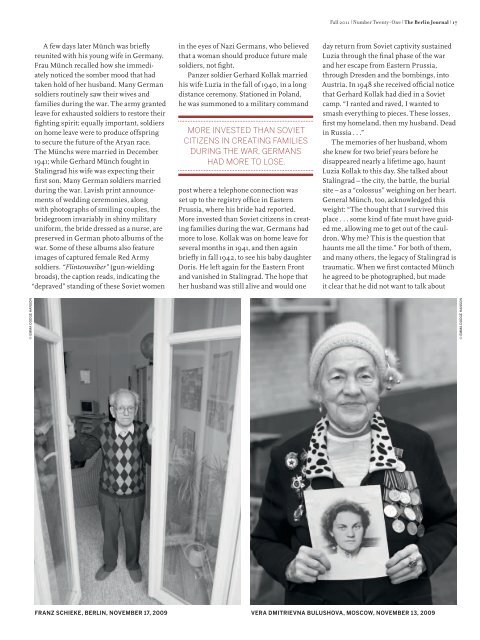Fall 2011 | Issue 21
- No tags were found...
You also want an ePaper? Increase the reach of your titles
YUMPU automatically turns print PDFs into web optimized ePapers that Google loves.
<strong>Fall</strong> <strong>2011</strong> | Number Twenty-One | The Berlin Journal | 17<br />
A few days later Münch was briefly<br />
reunited with his young wife in Germany.<br />
Frau Münch recalled how she immediately<br />
noticed the somber mood that had<br />
taken hold of her husband. Many German<br />
soldiers routinely saw their wives and<br />
families during the war. The army granted<br />
leave for exhausted soldiers to restore their<br />
fighting spirit; equally important, soldiers<br />
on home leave were to produce offspring<br />
to secure the future of the Aryan race.<br />
The Münchs were married in December<br />
1941; while Gerhard Münch fought in<br />
Stalingrad his wife was expecting their<br />
first son. Many German soldiers married<br />
during the war. Lavish print announcements<br />
of wedding ceremonies, along<br />
with photographs of smiling couples, the<br />
bridegroom invariably in shiny military<br />
uniform, the bride dressed as a nurse, are<br />
preserved in German photo albums of the<br />
war. Some of these albums also feature<br />
images of captured female Red Army<br />
soldiers. “Flintenweiber” (gun-wielding<br />
broads), the caption reads, indicating the<br />
“depraved” standing of these Soviet women<br />
in the eyes of Nazi Germans, who believed<br />
that a woman should produce future male<br />
soldiers, not fight.<br />
Panzer soldier Gerhard Kollak married<br />
his wife Luzia in the fall of 1940, in a long<br />
distance ceremony. Stationed in Poland,<br />
he was summoned to a military command<br />
MORE INVESTED THAN SOVIET<br />
CITIZENS IN CREATING FAMILIES<br />
DURING THE WAR, GERMANS<br />
HAD MORE TO LOSE.<br />
post where a telephone connection was<br />
set up to the registry office in Eastern<br />
Prussia, where his bride had reported.<br />
More invested than Soviet citizens in creating<br />
families during the war, Germans had<br />
more to lose. Kollak was on home leave for<br />
several months in 1941, and then again<br />
briefly in fall 1942, to see his baby daughter<br />
Doris. He left again for the Eastern Front<br />
and vanished in Stalingrad. The hope that<br />
her husband was still alive and would one<br />
day return from Soviet captivity sustained<br />
Luzia through the final phase of the war<br />
and her escape from Eastern Prussia,<br />
through Dresden and the bombings, into<br />
Austria. In 1948 she received official notice<br />
that Gerhard Kollak had died in a Soviet<br />
camp. “I ranted and raved, I wanted to<br />
smash everything to pieces. These losses,<br />
first my homeland, then my husband. Dead<br />
in Russia . . .”<br />
The memories of her husband, whom<br />
she knew for two brief years before he<br />
disappeared nearly a lifetime ago, haunt<br />
Luzia Kollak to this day. She talked about<br />
Stalingrad – the city, the battle, the burial<br />
site – as a “colossus” weighing on her heart.<br />
General Münch, too, acknowledged this<br />
weight: “The thought that I survived this<br />
place . . . some kind of fate must have guided<br />
me, allowing me to get out of the cauldron.<br />
Why me? This is the question that<br />
haunts me all the time.” For both of them,<br />
and many others, the legacy of Stalingrad is<br />
traumatic. When we first contacted Münch<br />
he agreed to be photographed, but made<br />
it clear that he did not want to talk about<br />
© EMMA DODGE HANSON<br />
© EMMA DODGE HANSON<br />
FRANZ SCHIEKE, BERLIN, NOVEMBER 17, 2009<br />
VERA DMITRIEVNA BULUSHOVA, MOSCOW, NOVEMBER 13, 2009

















